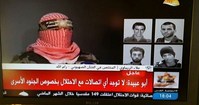25 apr 2016
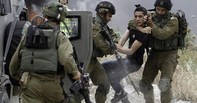
The Israeli Occupation Forces (IOF) arrested at dawn Monday seven Palestinians from different areas of the West Bank and Jerusalem.
Israeli Army said that four “wanted” Palestinians were arrested from their houses in al-Khalil for being affiliated with Hamas Movement.
The PIC reporter affirmed that two ex-prisoners, who were released during Shalit Swap deal, were among the reported detainees, while different neighborhoods were violently stormed.
In occupied Jerusalem, Israeli police forces arrested two brothers including a minor from Silwan town south of al-Aqsa Mosque.
A Palestinian academic was also arrested at a military checkpoint erected at the entrance to Nabi Salah town west of Ramallah. On the other hand, local sources said that Israeli forces stole at dawn today an amount of money and Jewelry from a slain Palestinian’s house in Beit Ummar town north of al-Khalil.
Local activist Mohamed Awad said that IOF soldiers violently stormed and searched the house before confiscating 1000 US dollars and 1500 grams of jewelry. The house belongs to the slain Palestinian Ibrahim Awad’s family, he pointed out. Awad’s mother was subjected to strip search more than once during the raid.
Ibrahim Awad died on October 10, 2015 of injuries he sustained on October 8 after Israeli forces opened fire at Palestinian protesters in Beit Ummar town.
Israeli Army said that four “wanted” Palestinians were arrested from their houses in al-Khalil for being affiliated with Hamas Movement.
The PIC reporter affirmed that two ex-prisoners, who were released during Shalit Swap deal, were among the reported detainees, while different neighborhoods were violently stormed.
In occupied Jerusalem, Israeli police forces arrested two brothers including a minor from Silwan town south of al-Aqsa Mosque.
A Palestinian academic was also arrested at a military checkpoint erected at the entrance to Nabi Salah town west of Ramallah. On the other hand, local sources said that Israeli forces stole at dawn today an amount of money and Jewelry from a slain Palestinian’s house in Beit Ummar town north of al-Khalil.
Local activist Mohamed Awad said that IOF soldiers violently stormed and searched the house before confiscating 1000 US dollars and 1500 grams of jewelry. The house belongs to the slain Palestinian Ibrahim Awad’s family, he pointed out. Awad’s mother was subjected to strip search more than once during the raid.
Ibrahim Awad died on October 10, 2015 of injuries he sustained on October 8 after Israeli forces opened fire at Palestinian protesters in Beit Ummar town.
22 apr 2016
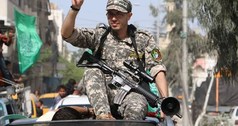
Israeli Occupation Authority (IOA) released on Thursday Mustafa Abu Muammar, 30 years old from Khan Younis and member of al-Qassam Brigades, the armed wing of Hamas Movement, after ten years of imprisonment.
Palestinian crowds participated in receiving Abu Muammar at Beit Hanoun (Erez) crossing in the northern Gaza Strip. Israeli courts sentenced Abu Muammar to ten years of actual imprisonment for belonging to Hamas Movement and affiliation with al-Qassam Brigades.
He was charged with monitoring Israeli soldiers and reporting their info to the Brigades. He was arrested in April, 2006.
The ex-detainee Abu Muammar was also accused of participating in the preparation of the tunnel used by the Brigades in capturing the Israeli soldier Gilad Shalit on June 25, 2006.
Shalit was released in 2011 within a prisoner swap deal that led to the release of over a thousand of Palestinian prisoners from Israeli jails.
Palestinian crowds participated in receiving Abu Muammar at Beit Hanoun (Erez) crossing in the northern Gaza Strip. Israeli courts sentenced Abu Muammar to ten years of actual imprisonment for belonging to Hamas Movement and affiliation with al-Qassam Brigades.
He was charged with monitoring Israeli soldiers and reporting their info to the Brigades. He was arrested in April, 2006.
The ex-detainee Abu Muammar was also accused of participating in the preparation of the tunnel used by the Brigades in capturing the Israeli soldier Gilad Shalit on June 25, 2006.
Shalit was released in 2011 within a prisoner swap deal that led to the release of over a thousand of Palestinian prisoners from Israeli jails.
18 apr 2016
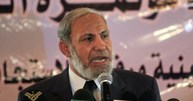
The senior leader in Hamas Movement Mahmoud al-Zahhar said that his group has the means to force Israeli authorities to accept a new prisoners swap deal.
Speaking to al-Aqsa local radio, Zahhar said that Palestinian prisoners will be released from Israeli jails by neither entreaties nor negotiations, but through a national prisoner exchange deal.
Zahhar’s statements came few hours after similar televised statements by spokesman for al-Qassam Brigades, Hamas’s armed wing, Abu Obeida in which he stressed that a new prisoner swap deal is coming.
"We have what will help achieve an honorable deal and satisfy our people and nation", Abu Obeida vowed.
Two weeks ago, al-Qassam Brigades declared the capture of four Israeli soldiers, refusing to give any further details before meeting the Palestinian resistance’s demands.
In November 2011, after more than five years of holding the Israeli soldier Gilad Shalit in captivity, al-Qassam Brigades forced Israel to accept a prisoner swap deal though Egyptian and German intermediaries.
The deal stipulated Shalit’s release in exchange for the release of more than 1,000 Palestinian prisoners in Israeli jails. There are currently 7,200 Palestinian prisoners in Israeli jails including 450 children and 69 women.
Speaking to al-Aqsa local radio, Zahhar said that Palestinian prisoners will be released from Israeli jails by neither entreaties nor negotiations, but through a national prisoner exchange deal.
Zahhar’s statements came few hours after similar televised statements by spokesman for al-Qassam Brigades, Hamas’s armed wing, Abu Obeida in which he stressed that a new prisoner swap deal is coming.
"We have what will help achieve an honorable deal and satisfy our people and nation", Abu Obeida vowed.
Two weeks ago, al-Qassam Brigades declared the capture of four Israeli soldiers, refusing to give any further details before meeting the Palestinian resistance’s demands.
In November 2011, after more than five years of holding the Israeli soldier Gilad Shalit in captivity, al-Qassam Brigades forced Israel to accept a prisoner swap deal though Egyptian and German intermediaries.
The deal stipulated Shalit’s release in exchange for the release of more than 1,000 Palestinian prisoners in Israeli jails. There are currently 7,200 Palestinian prisoners in Israeli jails including 450 children and 69 women.
17 apr 2016
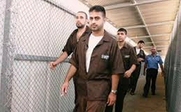
In the month of April, each year, Palestinian detainees, the Palestinian people, and the world mark the International Day of Solidarity with Palestinian Prisoners.
Prisoners’ Day has been commemorated since 1974 by the Palestinian National Council, when the first Palestinian prisoner, Mahmoud Hijazi, was freed in a prisoner exchange with the Palestinian Resistance. 17 April is a day of protests, rallies, marches, forums and more to commemorate the struggle of Palestinians imprisoned in Israeli occupation jails and demand their freedom.
The occasion comes, this year, with nearly 7,000 Palestinian prisoners trapped in Israeli prisons, including 69 women, 400 children and 450 administrative detainees held in 22 Israeli prisons and detention centers in inhumane conditions.
About 400 children under the age of 18 are currently held in Israeli prisons. Dima Al-Wawi, 12, and Shadi Farrah, 12, are the youngest, the Palestinian Prisoners’ Society said.
The number of administrative detainees currently confined to Israeli jails is 750, according to Al Ray Palestinian Media Agency; 700 are patient prisoners, including 23 prisoners languishing in Ramleh Prison Clinic, most of them receiving only painkillers and anesthetics.
In 2014, Israeli occupation authorities re-arrested more than 70 prisoners who were freed in the Shalit prisoners swap deal, most notably Nael Barghouti, who spent 34 years in Israeli jails.
Two prisoners, Jaafar Awad, 22, from Hebron, and Fadi Ahmad Al-Darbi, 30, from Jenin, died shortly after their release, due to the deliberate medical neglect policy, bringing the number of the slain, from the prisoners’ movement, to 207.
Facts and testimonies of detainees assure that the vast majority of those who have experienced incarceration were subjected to a form of physical or psychological torture; abuse and moral insult.
Within the Israeli restrictions imposed on the Palestinian prisoners, the Israeli Knesset has approved a number of racially biased policies, such as the force-feeding of prisoners on hunger strike, in 2015. Israeli courts have also been compelled to sentence stone-throwers with severe punishment, ruling a minimum of two years and a maximum of four years imprisonment.
Marking Palestinian Prisoners’ Day, many national and official bodies have launched conferences, ground-events, and demonstrations to support the rights of Palestinian prisoners trapped behind the Israeli bars.
Prisoners’ Day has been commemorated since 1974 by the Palestinian National Council, when the first Palestinian prisoner, Mahmoud Hijazi, was freed in a prisoner exchange with the Palestinian Resistance. 17 April is a day of protests, rallies, marches, forums and more to commemorate the struggle of Palestinians imprisoned in Israeli occupation jails and demand their freedom.
The occasion comes, this year, with nearly 7,000 Palestinian prisoners trapped in Israeli prisons, including 69 women, 400 children and 450 administrative detainees held in 22 Israeli prisons and detention centers in inhumane conditions.
About 400 children under the age of 18 are currently held in Israeli prisons. Dima Al-Wawi, 12, and Shadi Farrah, 12, are the youngest, the Palestinian Prisoners’ Society said.
The number of administrative detainees currently confined to Israeli jails is 750, according to Al Ray Palestinian Media Agency; 700 are patient prisoners, including 23 prisoners languishing in Ramleh Prison Clinic, most of them receiving only painkillers and anesthetics.
In 2014, Israeli occupation authorities re-arrested more than 70 prisoners who were freed in the Shalit prisoners swap deal, most notably Nael Barghouti, who spent 34 years in Israeli jails.
Two prisoners, Jaafar Awad, 22, from Hebron, and Fadi Ahmad Al-Darbi, 30, from Jenin, died shortly after their release, due to the deliberate medical neglect policy, bringing the number of the slain, from the prisoners’ movement, to 207.
Facts and testimonies of detainees assure that the vast majority of those who have experienced incarceration were subjected to a form of physical or psychological torture; abuse and moral insult.
Within the Israeli restrictions imposed on the Palestinian prisoners, the Israeli Knesset has approved a number of racially biased policies, such as the force-feeding of prisoners on hunger strike, in 2015. Israeli courts have also been compelled to sentence stone-throwers with severe punishment, ruling a minimum of two years and a maximum of four years imprisonment.
Marking Palestinian Prisoners’ Day, many national and official bodies have launched conferences, ground-events, and demonstrations to support the rights of Palestinian prisoners trapped behind the Israeli bars.
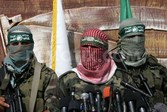
Hamas Movement’s armed wing, al-Qassem Brigades, vowed Sunday in televised statements to release all Palestinian prisoners and detainees in Israeli jails.
On the Palestinian Prisoner Day, spokesman for the Brigades Abu Obeida stressed that a new prisoner swap deal is coming soon. "We will keep our promise to them (prisoners) regardless of the cost", he continued.
"We have what will help achieve an honorable deal and satisfy our people and nation, Abu Obeida vowed. “Israeli leaders must know well that our prisoners are backed by brave men.”
In this regard, Abu Obeida warned the Israeli authorities of any attempt to evade from paying the price. There are currently 7,200 Palestinian prisoners in Israeli jails including 450 children and 69 women.
On the Palestinian Prisoner Day, spokesman for the Brigades Abu Obeida stressed that a new prisoner swap deal is coming soon. "We will keep our promise to them (prisoners) regardless of the cost", he continued.
"We have what will help achieve an honorable deal and satisfy our people and nation, Abu Obeida vowed. “Israeli leaders must know well that our prisoners are backed by brave men.”
In this regard, Abu Obeida warned the Israeli authorities of any attempt to evade from paying the price. There are currently 7,200 Palestinian prisoners in Israeli jails including 450 children and 69 women.
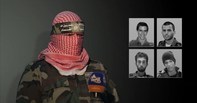
The higher leading committee for Hamas prisoners has said that the prisoners in Israeli jails need concrete actions instead of more celebrations and oratorical festivals held in solidarity with them.
In a press release on Sunday, the committee stressed the need for tangible moves ending the suffering of prisoners, especially those who are detained administratively and in isolation cells.
The committee also called on the Palestinians to rally around their national constants, which the martyrs and the wounded made great sacrifices to protect them.
"The message we has been jailed for should not be absent from the minds of our people and its leadership, and it is a message of duty and steadfastness," the committee underlined. It expressed its hope that "the occasion of the Prisoner Day would be the last for the Palestinian prisoners in Israeli jails this year."
Mishaal: Hamas is obliged to free prisoners
Head of Hamas's political bureau Khaled Mishaal has said that his Movement is committed to freeing prisoners from Israeli jails soon.
Mishaal made his remarks in a speech on Sunday on the occasion of the Prisoner Day and the anniversary of the martyrdom of Hamas leader Abdul-Aziz al-Rantisi.
The Hamas official pointed to efforts being made by Hamas to reach a prisoner swap deal soon to extract the freedom of many long-time and new prisoners.
Mishaal also talked about his Movement's respect for the rights of soldiers held captive in Gaza. "We are morally superior to the occupation, as evidenced by the treatment we gave prisoner Shalit because we are a people who have a great faith, mercy, humanity, values and heritage to cherish," he underscored.
In a press release on Sunday, the committee stressed the need for tangible moves ending the suffering of prisoners, especially those who are detained administratively and in isolation cells.
The committee also called on the Palestinians to rally around their national constants, which the martyrs and the wounded made great sacrifices to protect them.
"The message we has been jailed for should not be absent from the minds of our people and its leadership, and it is a message of duty and steadfastness," the committee underlined. It expressed its hope that "the occasion of the Prisoner Day would be the last for the Palestinian prisoners in Israeli jails this year."
Mishaal: Hamas is obliged to free prisoners
Head of Hamas's political bureau Khaled Mishaal has said that his Movement is committed to freeing prisoners from Israeli jails soon.
Mishaal made his remarks in a speech on Sunday on the occasion of the Prisoner Day and the anniversary of the martyrdom of Hamas leader Abdul-Aziz al-Rantisi.
The Hamas official pointed to efforts being made by Hamas to reach a prisoner swap deal soon to extract the freedom of many long-time and new prisoners.
Mishaal also talked about his Movement's respect for the rights of soldiers held captive in Gaza. "We are morally superior to the occupation, as evidenced by the treatment we gave prisoner Shalit because we are a people who have a great faith, mercy, humanity, values and heritage to cherish," he underscored.
10 apr 2016
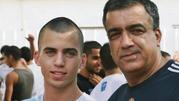
Herzl Shaul, now suffering from cancer, demands governement expedite the return of the remains of his son Oron who was killed in Shujaiya during Operation Protective Edge.
Herzl Shaul, the father of Oron Shaul, and suffering from cancer, called on the Israeli government to expedite the return of his son's remains in order to bury them in Israel.
First sergeant Oron Shaul was killed in an armored personnel carrier incident in Shujaiya on July 20, 2014 in which six other Golani soldiers were killed. Hamas announced that it had captured Oron, but the IDF determined that Oron had passed away. The Shaul family eventually accepted the IDF's narrative and sat shiva (Jewish week-long mourning period) for their son.
Approximately six months ago, Herzl said that he was suffering from chest pains and underwent a number of medical examinations, which revealed that he has cancer. His wife also previously had cancer, but now is under medical surveillance.
According to Herzl, the stress and concern for the fate of his son, who has not been able to bury until this day, has contributed to the deterioration of his health. "I wake up every morning and I feel that they are not doing enough to bring back Oron's body," he said.
Herzl also commented on his wife's perspective that they sat shiva in vain and Shaul is still living: "Zahava, my wife, believes that he is still living because a mother is mother. It is very difficult for her to accept the painful fact." He added, "However, from the evidence they (IDF) presented us, I have no doubt he has passed away and we must return his and Hadar Goldin's bodies."
Herzl believes the bodies will be returned, but thinks it will take time. A meeting between Oron's parents and Prime Minister Benjamin Netanyahu was supposed to take place Monday but it was put off due to the Shaul's medical problems. Oron's family intend to wage a public fight to have their son's remains returned.
Herzl Shaul, the father of Oron Shaul, and suffering from cancer, called on the Israeli government to expedite the return of his son's remains in order to bury them in Israel.
First sergeant Oron Shaul was killed in an armored personnel carrier incident in Shujaiya on July 20, 2014 in which six other Golani soldiers were killed. Hamas announced that it had captured Oron, but the IDF determined that Oron had passed away. The Shaul family eventually accepted the IDF's narrative and sat shiva (Jewish week-long mourning period) for their son.
Approximately six months ago, Herzl said that he was suffering from chest pains and underwent a number of medical examinations, which revealed that he has cancer. His wife also previously had cancer, but now is under medical surveillance.
According to Herzl, the stress and concern for the fate of his son, who has not been able to bury until this day, has contributed to the deterioration of his health. "I wake up every morning and I feel that they are not doing enough to bring back Oron's body," he said.
Herzl also commented on his wife's perspective that they sat shiva in vain and Shaul is still living: "Zahava, my wife, believes that he is still living because a mother is mother. It is very difficult for her to accept the painful fact." He added, "However, from the evidence they (IDF) presented us, I have no doubt he has passed away and we must return his and Hadar Goldin's bodies."
Herzl believes the bodies will be returned, but thinks it will take time. A meeting between Oron's parents and Prime Minister Benjamin Netanyahu was supposed to take place Monday but it was put off due to the Shaul's medical problems. Oron's family intend to wage a public fight to have their son's remains returned.
9 apr 2016
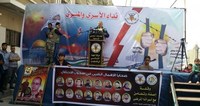
Senior Islamic Jihad official Khaled al-Batsh has called on the Palestinian resistance to capture Jewish settlers in order to clinch an "honorable" prisoner swap deal and extract the freedom of all detainees in Israeli jails.
Batsh made his remarks during a massive rally organized on Friday afternoon by Islamic Jihad outside the house of prisoner Abdul-Halim al-Balbisi in Jabaliya refugee camp, north of the Gaza Strip.
The Islamic Jihad official stressed that the Palestinian resistance in all occupied areas would continue to assume its role in pressuring the Israeli occupation state to stop its Judaization and settlement activities in the West Bank and Jerusalem.
He also called on the Palestinian young people to continue their intifada (uprising) against the occupation and its settlers and retaliate to the extrajudicial and mass killing of Palestinians taking place in Jerusalem and the West Bank.
For his part, ex-detainee Muthanna Abu Jalalah urged the Palestinian resistance factions to give high priority to the issue of prisoners in Israeli jails.
Batsh made his remarks during a massive rally organized on Friday afternoon by Islamic Jihad outside the house of prisoner Abdul-Halim al-Balbisi in Jabaliya refugee camp, north of the Gaza Strip.
The Islamic Jihad official stressed that the Palestinian resistance in all occupied areas would continue to assume its role in pressuring the Israeli occupation state to stop its Judaization and settlement activities in the West Bank and Jerusalem.
He also called on the Palestinian young people to continue their intifada (uprising) against the occupation and its settlers and retaliate to the extrajudicial and mass killing of Palestinians taking place in Jerusalem and the West Bank.
For his part, ex-detainee Muthanna Abu Jalalah urged the Palestinian resistance factions to give high priority to the issue of prisoners in Israeli jails.
7 apr 2016

The father of Israeli soldier Oron Shaul, who is reportedly held captive at al-Qassam Brigades in Gaza, accused the Israeli government with ignoring the issue of his son, saying that “the government is not doing anything for the sake of his release”.
Israeli authorities claim that soldier Shaul was killed along with another six soldiers during the Israeli war on Gaza in 2014, but his body was missing.
While, al-Qassam declared at the time that its members managed to capture soldier Shaul. A few days ago, Hamas Movement published photos of four Israeli soldiers as captives with no further details.
Hamas demands releasing Palestinian prisoners, who were released in Shalit swap deal then re-arrested by Israel, before talking about any new prisoner exchange deal.
Israeli authorities claim that soldier Shaul was killed along with another six soldiers during the Israeli war on Gaza in 2014, but his body was missing.
While, al-Qassam declared at the time that its members managed to capture soldier Shaul. A few days ago, Hamas Movement published photos of four Israeli soldiers as captives with no further details.
Hamas demands releasing Palestinian prisoners, who were released in Shalit swap deal then re-arrested by Israel, before talking about any new prisoner exchange deal.
3 apr 2016

Senior Egyptian intelligence officials make inquiries with Hamas delegation about the fate of soldiers Hadar Goldin and Oron Shaul, civilian Avra Mangisto and an unnamed Bedouin.
Senior Egyptian intelligence officials have reportedly made inquiries about the IDF soldiers who were killed during Operation Protective Edge and then snatched by Hamas, London-based al Araby al Jadeed reported on Sunday.
The Egyptian officials said that they discussed the fate of the "missing Israeli soldiers" with Hamas, apparently referring to the bodies of IDF soldiers Hadar Goldin and Oron Shaul as well as Avra Mangisto, an Israeli civilian who accidentally crossed into Gaza, and another unnamed Bedouin man.
The Egyptian officials raised the issue after a high-ranking Hamas delegation, which included Mousa Abu Marzook, Mahmoud Al-Zahar, Khalil Al-Hayya, Imad Al-Alami, and Nizar Awadallah, asked them about the fate of four Hamas members who were kidnapped on the Egyptian side of Rafah a few months ago.
Palestinian and Egyptian officials quoted by al Araby al Jadeed claimed that the Egyptian inquiry is a part of ongoing negotiations between Egypt and Hamas to open the Rafah crossing and end "the official Egyptian war against Hamas." Egypt also reportedly wants to restore its role of interlocutor between Israel and Hamas.
Hamas officials have said that prisoner swap negotiations with Israel are happening all over the place. Last Friday, Abu Obeida, a spokesperson of Hamas's armed wing, published archived photos of Hadar Goldin and Oron Shaul, Avra Mangisto, and another person.
Senior Egyptian intelligence officials have reportedly made inquiries about the IDF soldiers who were killed during Operation Protective Edge and then snatched by Hamas, London-based al Araby al Jadeed reported on Sunday.
The Egyptian officials said that they discussed the fate of the "missing Israeli soldiers" with Hamas, apparently referring to the bodies of IDF soldiers Hadar Goldin and Oron Shaul as well as Avra Mangisto, an Israeli civilian who accidentally crossed into Gaza, and another unnamed Bedouin man.
The Egyptian officials raised the issue after a high-ranking Hamas delegation, which included Mousa Abu Marzook, Mahmoud Al-Zahar, Khalil Al-Hayya, Imad Al-Alami, and Nizar Awadallah, asked them about the fate of four Hamas members who were kidnapped on the Egyptian side of Rafah a few months ago.
Palestinian and Egyptian officials quoted by al Araby al Jadeed claimed that the Egyptian inquiry is a part of ongoing negotiations between Egypt and Hamas to open the Rafah crossing and end "the official Egyptian war against Hamas." Egypt also reportedly wants to restore its role of interlocutor between Israel and Hamas.
Hamas officials have said that prisoner swap negotiations with Israel are happening all over the place. Last Friday, Abu Obeida, a spokesperson of Hamas's armed wing, published archived photos of Hadar Goldin and Oron Shaul, Avra Mangisto, and another person.
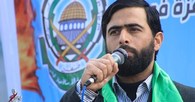
The Hamas Movement has said that its armed wing, al-Qassam Brigades, is making efforts to extract the freedom of all Palestinian prisoners in Israeli jails through clinching several swap deals with the Israeli side.
"Al-Qassam Brigades is preparing for second, third and fourth 'Wafa al-Ahrar' deals so as to clear all the jails of the Israeli occupation from all Palestinian prisoners," Hamas official and lawmaker Mushir al-Masri said.
Masri made his remarks during a sit-in organized on Saturday by the Islamic Women Movement near Beit Hanoun (Erez) border crossing, north of Gaza, to mark the 40th anniversary of Palestine's Land Day.
The Hamas official also reiterated his Movement's vow to continue along the path of resistance regardless of the cost until the liberation of the Palestinian land.
In October 2011, al-Qassam Brigades of Hamas was able to free more than 1,000 Palestinian prisoners from Israeli jails in exchange for Israeli soldier Gilad Shalit.
"Al-Qassam Brigades is preparing for second, third and fourth 'Wafa al-Ahrar' deals so as to clear all the jails of the Israeli occupation from all Palestinian prisoners," Hamas official and lawmaker Mushir al-Masri said.
Masri made his remarks during a sit-in organized on Saturday by the Islamic Women Movement near Beit Hanoun (Erez) border crossing, north of Gaza, to mark the 40th anniversary of Palestine's Land Day.
The Hamas official also reiterated his Movement's vow to continue along the path of resistance regardless of the cost until the liberation of the Palestinian land.
In October 2011, al-Qassam Brigades of Hamas was able to free more than 1,000 Palestinian prisoners from Israeli jails in exchange for Israeli soldier Gilad Shalit.
2 apr 2016
Statements made by the Qassam spokesman retaliated to Israeli premier Benjamin Netanyahu's statements over the capture of Israeli soldiers in Gaza.
Earlier Sunday, Netanyahu claimed that an important development has been reached in the case of missing soldiers in Gaza.
He added: "There are countless efforts underway in this regard, for which I hold meetings every few days. I have been briefed two days ago about a significant development, but of course it is impossible to achieve any progress on these issues except away from the limelight.
This will not be the only achievement pushed forward in this manner, through secret channels, but it is certainly the first of its kind."
On July 20, 2014 Qassem Brigades declared the capture of an Israeli soldier who was earlier identified as Shaul Aaron during the Israeli summer aggression on Gaza.
On August 1, 2014 Israeli authorities declared that they lost contact with the soldier Hadar Golden in Rafah south of Gaza. Israeli authorities then declared in July 2015 the disappearance of the Israeli-Ethiopian soldier Abraham Mengistu since September 2014 in Gaza Strip after he infiltrated into the besieged enclave.
Al-Qassam: "There Will Be No Free Information Regarding The Four Israeli Soldiers"
Earlier Sunday, Netanyahu claimed that an important development has been reached in the case of missing soldiers in Gaza.
He added: "There are countless efforts underway in this regard, for which I hold meetings every few days. I have been briefed two days ago about a significant development, but of course it is impossible to achieve any progress on these issues except away from the limelight.
This will not be the only achievement pushed forward in this manner, through secret channels, but it is certainly the first of its kind."
On July 20, 2014 Qassem Brigades declared the capture of an Israeli soldier who was earlier identified as Shaul Aaron during the Israeli summer aggression on Gaza.
On August 1, 2014 Israeli authorities declared that they lost contact with the soldier Hadar Golden in Rafah south of Gaza. Israeli authorities then declared in July 2015 the disappearance of the Israeli-Ethiopian soldier Abraham Mengistu since September 2014 in Gaza Strip after he infiltrated into the besieged enclave.
Al-Qassam: "There Will Be No Free Information Regarding The Four Israeli Soldiers"
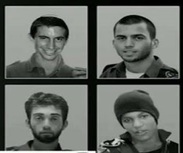
Abu Obeida, the spokesperson of the Al-Qassam Brigades, the armed wing of the Hamas movement, stated Saturday that there will be no free information regarding the fate of the four Israeli soldiers, believed to be in the hands of al-Qassam in Gaza since the war of 2014.
Abu Obeida said his group is not holding talks or negotiations, of any sort or shape, with any party about the fate of the four missing soldiers, and that "there will be no free information regarding the issue."
"If the Israeli enemy wants information, it should be ready and willing to pay the price," Abu Obeida stated, "This price must be paid before and after the (indirect) negotiations."
He also said that Israeli prime minister Benjamin Netanyahu was lying to the Israelis, and is "deceiving the families of the captive soldiers."
His statements were made after Netanyahu claimed last Sunday that there was what he called "an important development" regarding the missing soldiers.
Unlike the case of the former captured soldier, Gilad Shalit, Al-Qassam never presented any photos, audio or video showing the missing Israeli soldiers, or proof of life, as it is hoping to secure the release of Palestinian detainees before starting any indirect talks.
Israel has been largely quiet regarding the case of the four missing soldiers, and apparently, hoping to get information about their fate or location through other means, an issue that proved to be a huge failure in the case of Shalit.
Abu Obeida said his group is not holding talks or negotiations, of any sort or shape, with any party about the fate of the four missing soldiers, and that "there will be no free information regarding the issue."
"If the Israeli enemy wants information, it should be ready and willing to pay the price," Abu Obeida stated, "This price must be paid before and after the (indirect) negotiations."
He also said that Israeli prime minister Benjamin Netanyahu was lying to the Israelis, and is "deceiving the families of the captive soldiers."
His statements were made after Netanyahu claimed last Sunday that there was what he called "an important development" regarding the missing soldiers.
Unlike the case of the former captured soldier, Gilad Shalit, Al-Qassam never presented any photos, audio or video showing the missing Israeli soldiers, or proof of life, as it is hoping to secure the release of Palestinian detainees before starting any indirect talks.
Israel has been largely quiet regarding the case of the four missing soldiers, and apparently, hoping to get information about their fate or location through other means, an issue that proved to be a huge failure in the case of Shalit.
SWAP - A - B - C - D - E - F - G - H - I - J - K - L - M - N - O - P - Q - R - S - T - U - V - W - X - Y - Z
